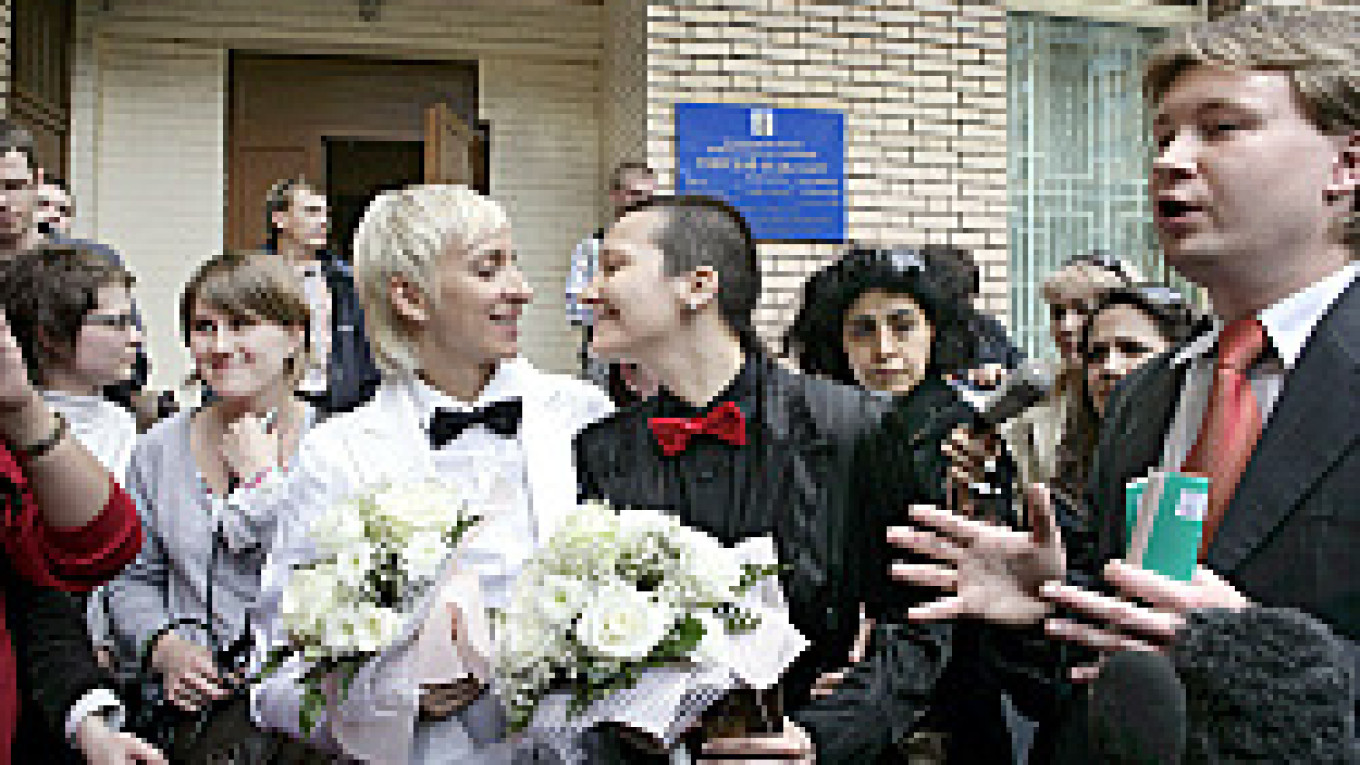The two women posed with bouquets of white roses before entering the Tverskoi branch of the State Registry Office on 3rd Tverskaya-Yamskaya Ulitsa with prominent gay rights activist Nikolai Alexeyev and a throng of foreign journalists.
The chief registrar, Svetlana Potamoshneva, initially refused to consider the women's request, citing the Family Code, which states that marriage requires the consent of a man and a woman.
She also noted that the official form only has sections for "he" and "she."
Alexeyev then persuaded her to consider a request written on a plain piece of paper.
All the participants stressed that they expected a refusal of the request.
Casual homophobia is widespread in Russia, and pop star Boris Moiseyev is virtually the only figure in the public eye to have come out as gay.
Gay marriages have been legalized in countries including Canada and Norway and in several U.S. states. Civil partnerships, which are marriages in all but name, have been permitted in many European countries.
Reporters packed into the registrar's tiny office Tuesday. One climbed up on a desk, which unexpectedly collapsed, scattering pens and dried flowers.
An hour later, Potamoshneva issued an official rejection of their request, citing the Family Code.
"You are now seeing a concrete example of discrimination against sexual minorities in Russia," Alexeyev said after reading the rejection letter aloud. "It's exactly what I expected."
Gay rights activists on several occasions have been beaten by opponents and physically prevented by police from staging gay pride events. Mayor Yury Luzhkov has repeatedly said he will never allow Moscow to have a gay parade, which he has dubbed "satanic."
Tuesday's stunt went smoothly, however, and no police were present. In order to avoid information being leaked to anti-gay protesters, only foreign journalists were invited to attend, said Nikolai Bayev, one of the organizers.
City Hall gave permission to a group called United Orthodox Youth to hold a picket Tuesday afternoon against a planned gay pride march on Saturday, the day of the Eurovision Song Contest final.
It was not the first time that gay rights activists have challenged Russia's marriage laws. In 2005, human rights activist Edvard Murzin - who is straight - attempted to register a marriage with Eduard Mishin, who publishes Kvir magazine. They were refused on the same basis.
Shepitko, 32, and Fedotova-Fet, 30, plan to travel to Toronto, Canada, in the summer to register their marriage there.
Canada legalized same-sex marriage in 2005, including for nonresidents.
Russian legislation has no clause on foreign marriages that would prevent a Canadian gay marriage being recognized in Russia, Alexeyev said, adding that he was "very optimistic" that the plan would work.
The couple said they have lived together for two years in Moscow.
Fedotova-Fet works in public relations, while Shepitko runs a beauty business.
The couple kissed several times outside the registry office. "We have decided not to hide. We love each other, and we want equal rights with heterosexual couples," Shepitko said. "We want to be accepted by society and the state."
Alexeyev said City Hall had yet to send an official refusal for activists' request to hold the gay pride march on Saturday.
"The march will go ahead in any case," Alexeyev said.
A Message from The Moscow Times:
Dear readers,
We are facing unprecedented challenges. Russia's Prosecutor General's Office has designated The Moscow Times as an "undesirable" organization, criminalizing our work and putting our staff at risk of prosecution. This follows our earlier unjust labeling as a "foreign agent."
These actions are direct attempts to silence independent journalism in Russia. The authorities claim our work "discredits the decisions of the Russian leadership." We see things differently: we strive to provide accurate, unbiased reporting on Russia.
We, the journalists of The Moscow Times, refuse to be silenced. But to continue our work, we need your help.
Your support, no matter how small, makes a world of difference. If you can, please support us monthly starting from just $2. It's quick to set up, and every contribution makes a significant impact.
By supporting The Moscow Times, you're defending open, independent journalism in the face of repression. Thank you for standing with us.
Remind me later.


